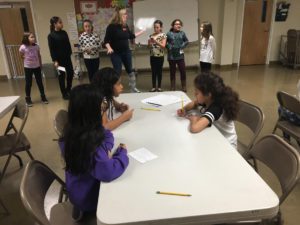Girl Power and BrainWise
Posted On: January 15, 2020

The YWCA of New Bedford, Massachusetts improves girls’ and women’s lives. In 2017, a YWCA administrator requested
BrainWise materials for her afterschool Girls Exclusive STEM program. She said that the organization had “heard amazing things about
BrainWise and we wanted to introduce the girls to the critical thinking process and teach them
brain science.”
The BrainWise classes were taught by development director Jordan Latham, Ph.D. Jordan said the girls loved the program, prompting her to take steps to expand its use throughout their agency. She said that BrainWise is a “jumping off point” and fits with everything they do. They teach the program in the classroom and reinforce its skills through activities, including films, art projects, and yoga classes.
“Last year, we used the film ‘
Inside Out‘ to help the girls apply the skills. We discussed behaviors using
BrainWise vocabulary and role playing. The girls were able to discuss the situations and emotions facing Riley, the teenage protagonist in ‘Inside Out’, and apply them to their own experiences. It really helped them address the struggles they are facing with behavioral issues.”
Academics and Crafts
Staff members Jary Gonzalez and Aaliyah Colon also teach
BrainWise and discussed how they use the
10 Wise Ways to help the girls develop ways they can “stop and think.” They integrate the
Wise Ways into science and financial literacy lessons as well as lessons on diversity awareness. They also use crafts as teaching tools of the
Wise Ways including having the girls make friendship bracelets to use as reminders to “stop and think.”

Everyone Has Problems and Problem Bags
Jordan values the Problem Bag lesson because it helps the girls recognize their similarities and differences and it helps to build empathy. She said the girls were surprised when they realized that others had the same problems; before the lesson, they thought they were the only ones and were unique in their concerns. She said this lesson also helps them to be aware that the intensity and types of problems can change quickly, and that little problems can become big problems and vice versa.
The differences in the perception of the gravity of one’s problems was illustrated by an example from “Period Poverty,” a signature project that seeks to make it easier for girls to get products for their menstrual cycles.
Impoverished girls often do not have access to tampons and pads for their menstrual cycles, and the project creates awareness of the barriers and embarrassment some girls face and their need for help.
Some families do not have funds to purchase hygiene products and government assistance programs such as SNAP and WIC do not cover them. Jordan said menstruation was a perfect topic to discuss Big Problems, Medium Problems and Small Problems and how they change and affect others.

Constellation of Support
The staff agreed that the
Constellation of Support lesson is an eye-opener because many of the girls are unaware of the resources around them, or they do not realize they can use them, and/or they have never stopped to think about how to seek support that helps them. The lesson makes them aware that their primary caretakers may not be able to help them with all of their problems and it helps the girls to understand why and how they can use other sources for support.
Additionally, the lesson provides many opportunities for the girls to create their own Constellations of Support. They draw pictures and cut pictures out of magazines and use different ways to show support with double lines, single lines, and broken lines. The lesson also helps expand their thinking to include a wider range of support that includes not only individuals, but pets, books, and spirituality or religion. The result is that the lesson helps the girls think about to whom they may go for support and it gives them an array of more choices.
The Emotions Elevator
Jordan said that just getting the girls to talk about their emotions is a big step to getting them to work on their problems.
BrainWise helps because the class is a safe place for them to talk, especially about personal issues such as mental health. She said the
BrainWise vocabulary gives them shared words and the 10
Wise Ways builds the scaffolding that helps each girl to understand the own problem-solving process. She said they learn to lower their
Emotions Elevators using breathing, meditation, yoga, and mindfulness, but they also realize how this is tied into Wizard
Brain thinking, Red Flag warnings, and their Constellation of Support.
As the girls learn more concepts, they build on the earlier lessons and combine them to prevent and solve problems. BrainWise helps the girls be empathetic to the problems of others and teaches them to use critical thinking to be confident, assertive, and effective leaders.
Empathy
Empathy is taught throughout the 10 Wise Ways, from recognizing how problems affect people differently, as with the Period Project, to being aware of how taking other people’s points of view improves communication outcomes. (I know we have different ideas, but let’s try to find something we agree on.) “A Beautiful Day in the Neighborhood,” the movie on Mr. Rodgers starring Tom Hanks, is a good resource for discussing the 10 Wise Ways. The following film trailer shows why.
Please follow and like us:
 The YWCA of New Bedford, Massachusetts improves girls’ and women’s lives. In 2017, a YWCA administrator requested BrainWise materials for her afterschool Girls Exclusive STEM program. She said that the organization had “heard amazing things about BrainWise and we wanted to introduce the girls to the critical thinking process and teach them brain science.”
The YWCA of New Bedford, Massachusetts improves girls’ and women’s lives. In 2017, a YWCA administrator requested BrainWise materials for her afterschool Girls Exclusive STEM program. She said that the organization had “heard amazing things about BrainWise and we wanted to introduce the girls to the critical thinking process and teach them brain science.”

